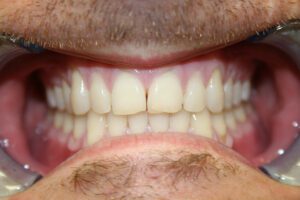
Handling a denture requires care. It is a good idea to stand over a folded towel or a sink of water just in case you accidentally drop the denture. Many people who wear dentures do not know exactly the best way to clean them. Different methods are used, which usually damages the dentures. The ideal way to clean a removable denture is with a paste product. It better then soaking the dentures in effervescent or enzyme cleaning solutions, which might damage them. Keeping the dentures clean is very important, as unclean dentures can lead to many oral complications. Clean and free from plaque dentures can help prevent oral infections and gingivitis.
However, there are only a few clinical studies, which focus on the best way to clean partial or removable dentures. A denture should be cleaned by thoroughly rinsing off loose food particles. A Moist brush and a denture cleaner can be used to keep them clean. All surfaces of the dentures should be brushed gently to avoid damaging the plastic or bending the attachments.A denture could lose its proper shape if it is not kept moist. At night, the denture should be placed in soaking solution or water. However, if the appliance has metal attachments, they could be tarnished if placed in soaking solution. A dentist can recommend the proper method for keeping your dentures in good shape. Dr. de Souza and colleagues conducted a number of clinical trials with the Ribeirão Preto Dental School of the University of São Paulo in Brazil. They evaluated six randomized controlled studies. In some studies, the denture wearers were in institutions, while other studies involved patients at university dental clinics. Studies compared different denture cleaning methods to one another or to a placebo. These cleaning methods included soaking dentures in enzyme solutions, soaking in effervescent solutions, routine brushing with a paste product and a combination of brushing and soaking. The studies examined the effects of each method on results such as irritation in the mouth or inflammation of the gums and other oral tissue, the presence of bad breath and how much plaque was on the dentures.
Although it is not possible to find out what method works best, Dr. de Souza concluded that there was weak evidence that among chemical cleaners, enzyme-cleaning products were more effective than a placebo. He also concluded that brushing can give better results but a patient with poor manual dexterity who cannot brush well might be better off using chemical cleaners and soaks. It is also recommended by Susan Brackett, D.D.S, director of public and professional relations for the American College of Prosthodontists, that patients can clean their dentures by brushing with dishwashing soap to get the major debris off. All dentures should be stored in water or a cleaning solution overnight because dentures should not dry out. If they like, patients can soak the dentures in an effervescent solution overnight. Both of these methods can be used, but it is not necessary. De Souza said that professionals usually do not recommend boiling dentures because it can cause them to deform. Similarly, heating dentures in water or another solution in a microwave oven can cause damage to the dentures, Brackett said. If household bleach is used then it should be done with extra care, because it can cause discoloration in gum-colored portions of dentures. Brackett included that sometimes a solution of water, bleach, and Calgon to treat a yeast infection is recommended, but that is not something for a routine basis. Another cleaning method is an ultrasound device that vibrates the water the dentures are in. Brackett said that battery-operated ultrasound cleaners are available for about $10, but that the professional models used by prosthodontists’ offices to clean dentures are better.

